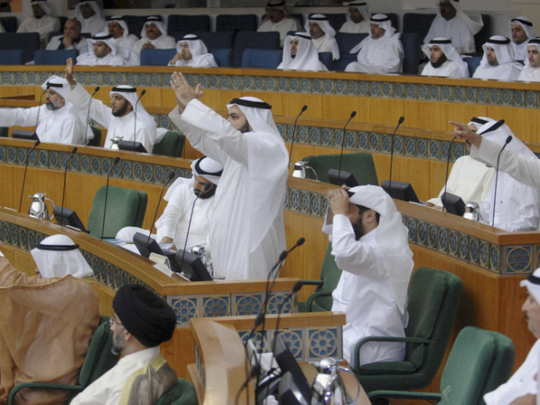
Kuwait City: Tuesday was the last day of the 15th legislative term of Kuwait’s National Assembly (parliament), where MPs voted on various laws, from the demographic imbalance law to the change in electoral voting system.
The Emir, Sheikh Nawaf Al Ahmed Al Jaber Al Sabah, opened the fifth supplementary session, otherwise known as the last session before the legislative term ends.
During his speech, the Emir called for unification as he said, “National unity has proven to be our strongest weapon in facing challenges, dangers and crises.”
The Prime Minister, Sheikh Sabah Al Khalid Al Sabah, also addressed the parliament and pointed out that the government and national assembly should work together to, “diversify revenue sources and rationalise spending and consumption, without detriment to citizens.”
After the opening remarks by the Emir and Prime Minister, parliament voted on a series of laws, before the end of the legislative term as the country prepares for parliamentary elections on December 5.
Demographic imbalance bill
All 53 MPs present unanimously approved the second deliberation of the demographic law, which will now be referred to the government for implementation.
The MPs voted on a revised draft law, which had amendments from the previous proposal, most notably the deletion of the second clause of article 1 which states that a maximum limit of expats would be determined depending on the percentage of the number of citizens.
In addition, the law stipulates that the government is required to determine the quota for the total number of expats within a year of the law going into effect.
Various articles were removed in the revised draft, including an article that detailed those that are exempt from the law like children of Kuwaiti women and GCC citizens.
Both the government and MPs agreed on the amendments, after both parties held a meeting earlier this week to discuss changes to the previous law, which was approved in its first deliberation last month.
After the meeting, MP Osama Al Shaheen said in a statement that several ministers, including Minister of Social and Economic Affairs Mariam Al Aqeel, Minister of Public Works Rana Al Fares, and Minister of commerce Khaled Al Roudhan, attended the meeting and gave their comments on the draft law.
On September 29, the National Assembly approved a demographic imbalance bill in its first deliberation. Out of the 41 members present, 29 approved the draft law which proposes controlling the employment rates and dividing them in a way that does not have a negative impact on the economy, the social make up and the service industry.
The first deliberation was not approved by the government.
During the first deliberation session, Al Aqeel said, “The demographic file is very important and the government has comments on the report that was drafted by the Human Resources Committee.”
She added, “The government considers not to vote on the law until the comments are agreed upon.”
In recent months, there has been ongoing discussion regarding the demographic imbalance, as expats make up 70 per cent of Kuwait’s population.
In August, several MPs along with Al Aqeel, submitted proposals to the human resources committee to address the demographic imbalance. The various proposals point out short- and long-term plans with regards to the demographic imbalance.
Change in electoral voting system
During Tuesday’s session, the MPs voted against the change in electoral law, which was calling to change the one-vote system to a two-vote system.
Out of the 57 members, 24 approved changing the electoral system, 31 rejected and two abstained.
Since the legislative term began in 2016, MPs have put forward 46 proposals to change the electoral system.
The electoral law was last changed in 2012 per an Emiri decree by the late Emir, Sheikh Sabah Al Ahmed Al Sabah. The decision created a greater divide between the opposition and the government as opposition saw the amendment as a form of democratic repression. Since then, many people stood with the opposition and boycotted the elections, neither running for parliament nor casting their vote.
Closing session
After all the laws were voted on, Marzouq Al Ghanim, Speaker of the National Assembly, announced that the fifth supplementary session is over, thus marking the end of the 15th legislative term.
The current parliamentary session, which began in 2016, is the sixth legislative term in the history of Kuwait to hold a supplementary fifth session, otherwise known as the closing session. The last legislative term that had a closing session was the ninth legislative term that began in 1999 and ended in 2003.
Every legislative term since 2003 has been dissolved and elections for a new parliament were carried out.
According to Article 107 of the Kuwaiti constitution, “The emir has the right to dissolve the parliament by a decree that shows the reasons for this dissolution. And if the parliament was dissolved, fresh elections for a new parliament should be held within no longer than a two-month period from the date of dissolution.”
Between 1975 and 2016, ten parliaments were dissolved by Emiri decrees.








